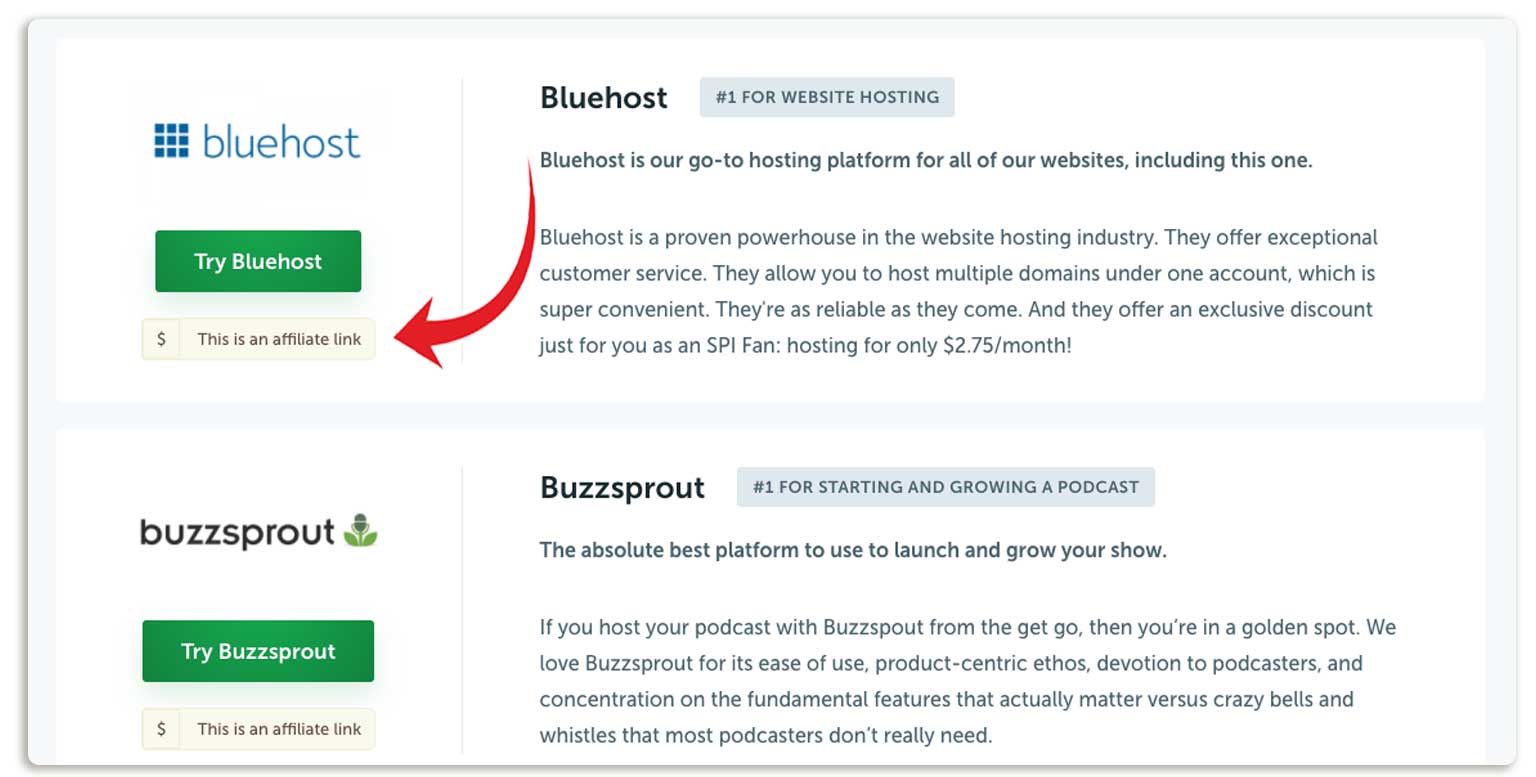f you’ve ever visited this site before, you know that affiliate marketing offers huge potential for earning a passive income.
You also know that learning affiliate marketing basics can take a lot of time and effort.
If you’re currently trying to understand the ins and outs of affiliate marketing, there’s no doubt you’ve encountered the concept of affiliate disclosures.
This particular feature of affiliate marketing may seem complicated, but it’s actually fairly simple to get a grasp on.
That being said, it’s also extremely important to understand.
So, before you start looking for affiliate programs let’s go over the details of affiliate disclosures so that you can properly incorporate them into your content.
What is an affiliate disclosure?
Let’s get right into this. What exactly are affiliate disclosures?
First, I’d like to quickly define the affiliate marketer relationship so that we have a solid understanding.
A typical affiliate marketing relationship involves three parties: the advertiser, the publisher, and the consumer.
The advertiser pays the publisher or affiliate marketer to promote their products and make sales.
When the consumer purchases a product with an affiliate link, the publisher gets a commission of the sale.
Now, an affiliate disclosure is how you let your audience know that the products listed in your content may be affiliate products.
In other words, you’re letting your readers know that you may be getting paid to promote these products.
Why do I need to disclose my affiliate links?
So, you may be asking why it’s necessary to go through the hassle of disclosing affiliate links.
The answer is pretty simple: it’s a legal requirement.
That’s right, a little organization called the Federal Trade Commission (FTC) says if you’re promoting affiliate products, you have to include a disclosure.
There’s no way out of this requirement without getting into some potentially serious legal trouble.
Now, aside from it being a federal legal requirement, it’s in good faith to keep an honest relationship with your audience.
Think of this way: the more transparent you are with your readers, the more trust you build. The more trust you build, the more conversions you make.
So, if you’re worried that disclosing your affiliate links will cause you to lose leads, it’s actually the other way around.
All that being said, including your affiliate disclosures is a fairly painless process. Let’s talk about when and how you should include an affiliate disclosure.
When should I include an affiliate or advertiser disclosure?
Now, before you go sticking an affiliate disclosure into your “About” page or “terms of agreement,” there are a few things you should understand.
First, and most importantly, the FTC clearly states that affiliate disclosures need to be “clear and conspicuous.”
So, what does that mean?
Simply put, your affiliate disclosure should be in an obvious place every time you publish content that includes affiliate products.
This applies to traditional affiliate products but also products that were given to you for free with the intent of promotion.
On the flip side, if you’re simply linking products that you think are useful to your audience and you’re not getting paid to do it, then you don’t need to disclose anything.
One last thing to keep in mind– even if you’re placing your affiliate links in your comment section or a tweet, you still need to disclose it.
The same goes for simply posting a picture of a product. Just posting a picture of an affiliate product can influence someone to purchase that product using your link.
As a general rule, anytime you’re promoting an affiliate product, even if you’re not actively reviewing the product and no matter what platform it’s on, you have to include a clear and obvious disclosure.
What happens if I don’t disclose affiliate links?
It’s always good to have the full story, so let’s talk about what happens if you decide not to disclose an affiliate link.
Let’s say you have an affiliate agreement with your favorite clothing company.
You post a picture on your Instagram wearing a t-shirt from this brand and let your followers know they can find a link to the product in your bio.
Seems harmless enough, right?
Well, the hard reality is, without including the proper affiliate disclosure in this scenario, you’re actually breaking the FTC guidelines.
The FTC actively monitors and investigates what they believe may be cases of deceptive advertising.
If you get caught in the act of failing to disclose your links you will be expected to give up any profit that you received from the products that you promoted.
Now, in most cases, the FTC focuses on the advertiser if disclosures become an issue. That means, if you fail to disclose your affiliate links, the company you partner with will face legal trouble.
For affiliates who make it a habit to fail to disclose, the FTC will take action against them as well.
How to Disclose Affiliates Links on Different Platforms
So now that we have the legal stuff out of the way, let’s talk about how to go about including an affiliate disclosure.
Every platform has different requirements due to the nature of the content and potential character limits.
The most important thing to remember is to keep your affiliate disclosure super clear and to put it in an obvious place.
Here’s how you can include an affiliate disclosure on different platforms:
Blogs: Putting an affiliate disclosure on your blog post is a pretty simple process. The first thing you need to do is make sure it’s at the top of your post and above the fold.
 (Example from Moneyunder30.com)
(Example from Moneyunder30.com)
Putting an affiliate disclosure at the bottom the article is not going to fly.
You’ll also need to make sure it’s crystal clear that the products you’ve linked are affiliate products and that you may receive a commission your reader uses the link.
Pat Flynn gives us is a great example of a clear and obvious affiliate disclosure.
And he makes it extremely clear which products he is profiting from.
 (Example from Smartpassiveincome.com)
(Example from Smartpassiveincome.com)
Social Media: You’ve probably seen plenty of affiliate disclosures on Instagram and Twitter. They typically come in the form of a hashtag and a small disclaimer in the caption.
Because these platforms have short character requirements for the caption, the affiliate disclosure can be shorter than it would be in a blog post.
You can start your post like this:
Ad: write caption here
Sponsored: write caption here
Affiliate: write caption here
Hashtags often look like this:
#affiliatelink
#sponsored
#ad
Affiliate links on most social media platforms found in the user bio. Make it clear that the link is for affiliate products by including “affiliate products,” in front of the link.
And remember, disclosures apply to social media “stories” as well!
YouTube: Many Youtubers simply include an affiliate link in the description box of their video. Now, you should definitely be doing this, but you may want to consider taking it a step further.
Think of it this way– anybody, anywhere can simply take the link to your video and put somewhere on the internet.
If this happens, viewers won’t be able to see your video description box from the platform they’re watching it on.
For this reason, it’s best to include an affiliate disclosure in the video itself. You can do this by verbally stating that its an affiliate product, or by including a simple text box in the video.
Affiliate Disclosure Templates for a Blog
To make all of this just a little bit easier for all of you, I’ve put together an easy template that you can use to disclose affiliates on your blog posts.
Of course, we’re not lawyers over here, so make sure to have your own attorney take a look at your disclosure should you choose to use one of these templates.
Affiliate Disclosure Template #1
Disclosure: We may receive a commission based on any purchases made from the products listed on this post. Here at [insert blog name], we choose affiliate products that we feel accurately represent our values. We thoroughly research each affiliate product and hope that each recommended product is something that our users will find useful. Using our affiliate links comes at no extra cost to you, but we will receive a portion of the sale. Sales from our affiliate links help keep this blog running.
Affiliate Disclosure Template #2
Disclosure: [Insert blog name] is a completely free resource that includes, comparisons, guides, and product reviews. We use affiliate links on our website to help support and deliver well-research content.
In order to help keep [Insert blog name] a completely free resource, we may receive a small commission from any products or services listed on this website.
The commission may impact the order in which information and our advertising partners are presented on the pages or blog articles (For example, the order in which they appear on the page). Some of the products and services we recommend pay us a referral fee for referring new members. If you click on an affiliate link on [Insert blog name] and enter information such as (name, email, address, or phone number) We may receive a referral commission. Of course, we also products and services that don’t pay us.
Affiliate Disclosure Template #3
Disclosure: The products listed on this page may be affiliate products. [Insert blog name] may receive a portion of the sale of any products mentioned on this site. Please note that we choose our affiliate products after testing and finding them to be of a high standard.
Affiliate Disclosure Template #4
Disclosure: We aim to be completely transparent with the way we do business. This post contains affiliate links. [Insert blog name] may receive a small portion of the sale of products on this page. Thank you for your support.
Final Advice
Affiliate disclosures might seem a bit complicated or tricky, but it’s actually pretty simple as you can see. The best advice I can give you is to keep your disclosures clear and obvious. The audience should see your disclosure before they read about your affiliate products. As long as you use that as your guiding principle, you should be just fine.
